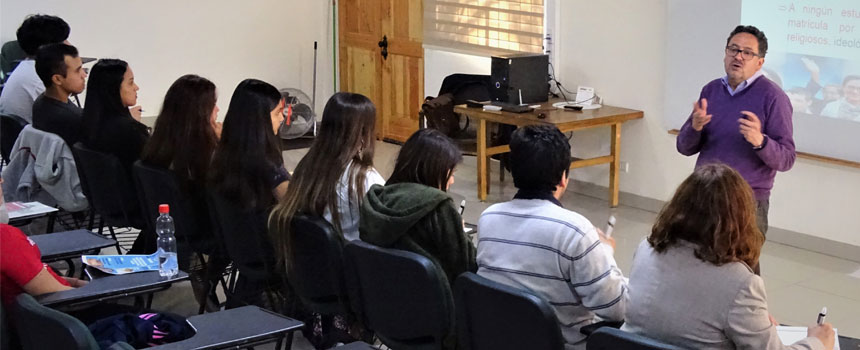
The activity was organized by the Pedagogy in Biology and Natural Sciences major, and was aimed at students, teachers and graduates.
With the purpose of publicizing the modifications produced in the current educational reform and guiding future professionals regarding the requirements that they demand in their initial training, academic Richard Bravo gave the workshop titled “Teaching Profession and the Chilean Educational System” , in which he addressed the main implications of the latest laws implemented.
The first part of the activity was called “Hyper reformism in Chilean educational policy: the succession of changes in recent years” and was focused on explaining in detail the milestones and advances of educational legislation, mainly Law 20.845 on Inclusion School and Law 21.040 of the Public Education System.
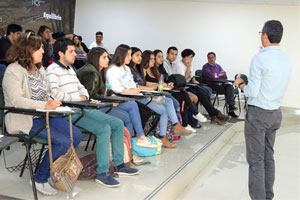 “The significant contribution of Law 20.845 is that it puts the consideration of education as a social right back into the public sphere (…), as of December 31, 2025, establishments that received direct or State subsidy had to become free (…) A gradual deadline was also established for this type of establishment to stop selecting those who enter, a mechanism known as 'La Tómbola' where students apply randomly and may or may not stay in certain establishments. The spirit of the Law is to once again diversify the social composition of the establishments because to a large extent as a country we have one of the most segregating educational systems in the world and that segregation has to do with the social factor of the student. The topic allows us to see in some way this social recomposition of the establishments and, on the other hand, acts under the principle that all people have the same equal opportunities to enter these schools and that they are not necessarily selected based on a test. of admission,” explained the academic.
“The significant contribution of Law 20.845 is that it puts the consideration of education as a social right back into the public sphere (…), as of December 31, 2025, establishments that received direct or State subsidy had to become free (…) A gradual deadline was also established for this type of establishment to stop selecting those who enter, a mechanism known as 'La Tómbola' where students apply randomly and may or may not stay in certain establishments. The spirit of the Law is to once again diversify the social composition of the establishments because to a large extent as a country we have one of the most segregating educational systems in the world and that segregation has to do with the social factor of the student. The topic allows us to see in some way this social recomposition of the establishments and, on the other hand, acts under the principle that all people have the same equal opportunities to enter these schools and that they are not necessarily selected based on a test. of admission,” explained the academic.
Regarding the progress of this Law, in terms of the composition of the associations, the professional explained that as of July 2017, 17,8% of non-profit institutions changed from the support modality to foundations; 39,33% carried out procedures to become non-profit institutions; 39% had not carried out any procedure; and 5% became private schools.
On the other hand, Law 21.040 stipulates that the administration of educational establishments will once again be the responsibility of the State through the Local Public Education Services, estimating the creation of seventy by 2025, of which to date there are only four established.
On the other hand, the second part of the workshop made reference to the professionalism of the teaching career, the assumptions, implications and tensions that this has meant. Among the milestones indicated by the academic, are the implementation of Law 19.961 that creates the Teacher Performance Evaluation, Law 20.501 on Quality and Equity in Education, and Law 20.903 that creates the Teacher Professional Development System .
“The implications of Law 19.961 are fundamentally related to the fact that teachers are evaluated through four instruments that collect direct information about their practice. Regarding Law 20.501, it indicates that the director may annually propose to the supporter the termination of the employment relationship of up to 5% of the teachers evaluated as unsatisfactory. And, finally, Law 20.903 mainly establishes that those who study pedagogy courses must take two non-qualifying diagnostic tests, but they are mandatory at the beginning and at the end of the course,” he expressed.
During the day, the academic responded to all the concerns of the attendees, among whom were graduates, academics and students, mostly of the fourth level of the Pedagogy in Biology and Natural Sciences career, and it is expected to continue with the realization of these informative workshops, which provide a complementary and contingent contribution regarding the initial training of future teachers.
Source: Integrated Pedagogy Management Unit (UGIP) | PMI FIP ULS1501 - CM ULS 1755

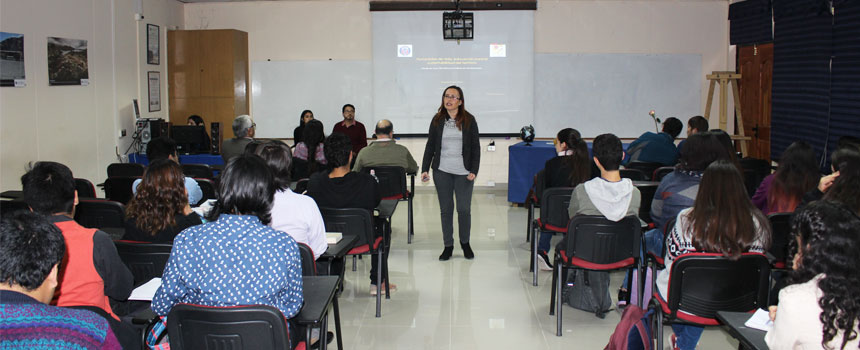
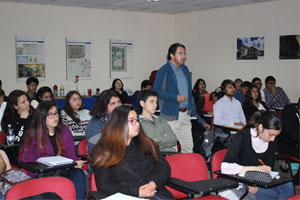 The presentation focused on the case study of the Huentelauquén Wetland Ramsar Site was given by the academic and Coordinator of the Geography Area, Mg. in Geographic Sciences, Marcela Robles; the academic, Mg. in Sciences, Víctor Bravo, and the Lic. in Education, Rubén Castillo, who were part of the multidisciplinary team that developed the study of biodiversity and conservation of the wetland biota, which laid the foundations for Las Salinas de Huentelauquén, with the support of the agricultural community, was declared a Ramsar Site.
The presentation focused on the case study of the Huentelauquén Wetland Ramsar Site was given by the academic and Coordinator of the Geography Area, Mg. in Geographic Sciences, Marcela Robles; the academic, Mg. in Sciences, Víctor Bravo, and the Lic. in Education, Rubén Castillo, who were part of the multidisciplinary team that developed the study of biodiversity and conservation of the wetland biota, which laid the foundations for Las Salinas de Huentelauquén, with the support of the agricultural community, was declared a Ramsar Site.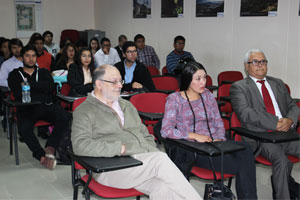 The ULS academic added that at the national level “we already have 14 Ramsar sites and we want to increase the number of protected spaces, because we know that they play such an important role as an ecosystem service. We have a lot of faith in this XNUMXst century education, using and valuing more what we have.”
The ULS academic added that at the national level “we already have 14 Ramsar sites and we want to increase the number of protected spaces, because we know that they play such an important role as an ecosystem service. We have a lot of faith in this XNUMXst century education, using and valuing more what we have.”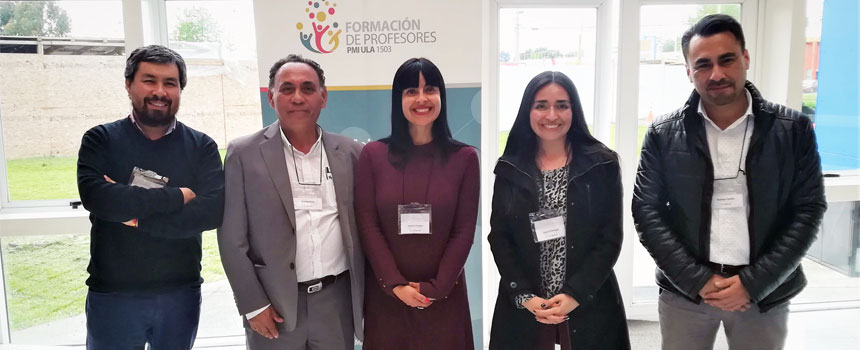
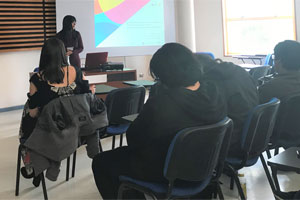 In this context, the researchers from the Integrated Management of Pedagogies Unit (UGIP), Dr. Rodrigo Ruay, Dr. Haylen Perines, Dr. Hugo Tapia and Dr. Laura Espinoza together with the academic from the ULS Department of Education, Rodrigo Castillo, They presented various presentations related to their respective areas of work.
In this context, the researchers from the Integrated Management of Pedagogies Unit (UGIP), Dr. Rodrigo Ruay, Dr. Haylen Perines, Dr. Hugo Tapia and Dr. Laura Espinoza together with the academic from the ULS Department of Education, Rodrigo Castillo, They presented various presentations related to their respective areas of work.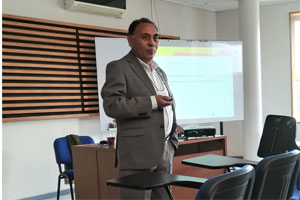 In another area, the work led by Dr. Tapia related to “ICT Subjects in Initial Teacher Training in Chile: a quantitative review” was announced, which is carried out together with Dr. Karla Campaña and Rodrigo Castillo .
In another area, the work led by Dr. Tapia related to “ICT Subjects in Initial Teacher Training in Chile: a quantitative review” was announced, which is carried out together with Dr. Karla Campaña and Rodrigo Castillo .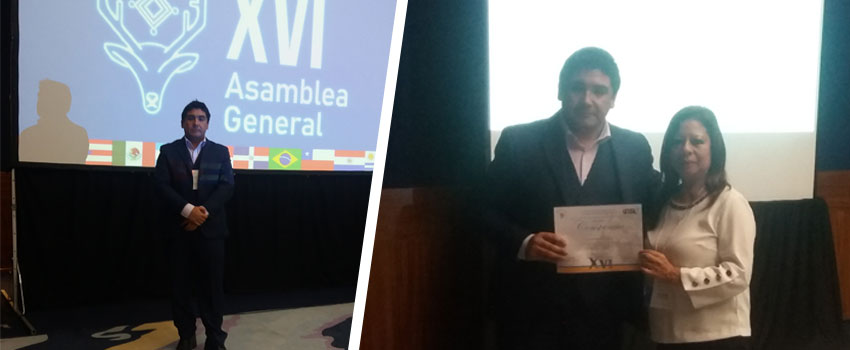
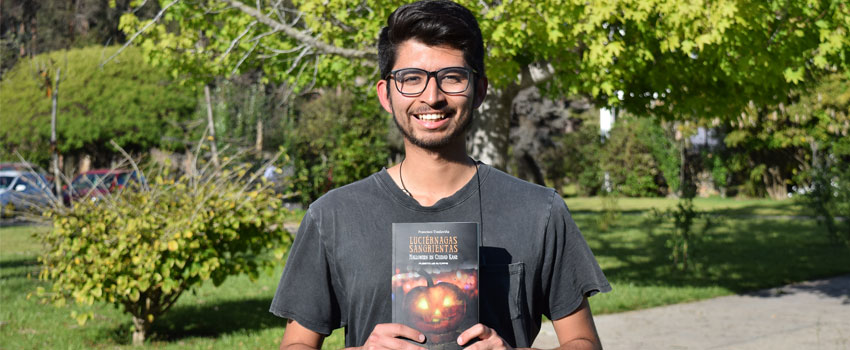
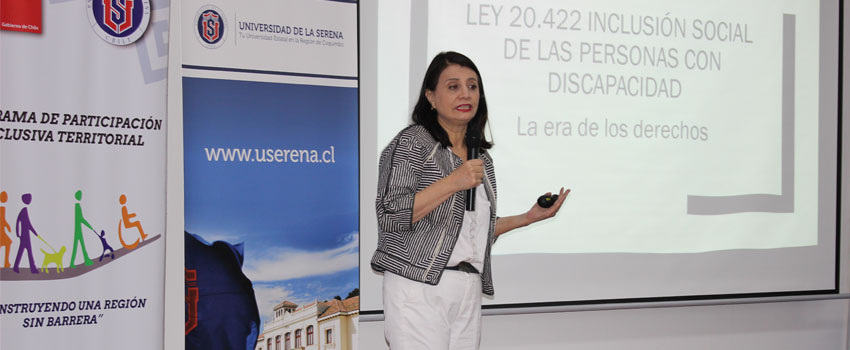
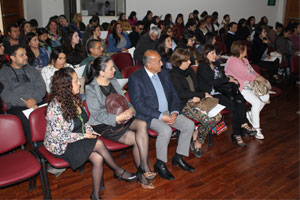 The Seminar held in the Pentagon Hall of the ULS, aimed to provide a conceptual and experiential approach to the topic of autonomy and independent living of people with intellectual disabilities in Chile. It was aimed at teachers, families of people with intellectual disabilities, professionals related to the area, social organizations of and for people with disabilities belonging to the Coquimbo Region and the general public.
The Seminar held in the Pentagon Hall of the ULS, aimed to provide a conceptual and experiential approach to the topic of autonomy and independent living of people with intellectual disabilities in Chile. It was aimed at teachers, families of people with intellectual disabilities, professionals related to the area, social organizations of and for people with disabilities belonging to the Coquimbo Region and the general public.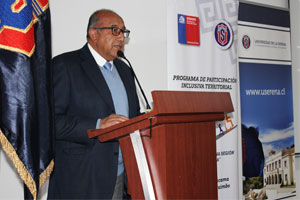 In addition, there were reports of experiences from organizations that currently develop programs for people with intellectual and mental disabilities, among them: the Fuerza y Voluntad Group, with “Verde Inclusion”; Las Compañías Community Mental Health Center, with “Community intervention for people with mental disabilities: challenges for social inclusion”; University Program of Social Labor Training for people with Intellectual Disabilities (PRUFODIS) Central University, with “Supported employment experiences, based on university training”; Jean Piaget Labor Center, with “Preparation for working life: a key step for the independent life of people with disabilities”, and Edudown La Serena Group, with “Opening doors towards inclusion”.
In addition, there were reports of experiences from organizations that currently develop programs for people with intellectual and mental disabilities, among them: the Fuerza y Voluntad Group, with “Verde Inclusion”; Las Compañías Community Mental Health Center, with “Community intervention for people with mental disabilities: challenges for social inclusion”; University Program of Social Labor Training for people with Intellectual Disabilities (PRUFODIS) Central University, with “Supported employment experiences, based on university training”; Jean Piaget Labor Center, with “Preparation for working life: a key step for the independent life of people with disabilities”, and Edudown La Serena Group, with “Opening doors towards inclusion”.